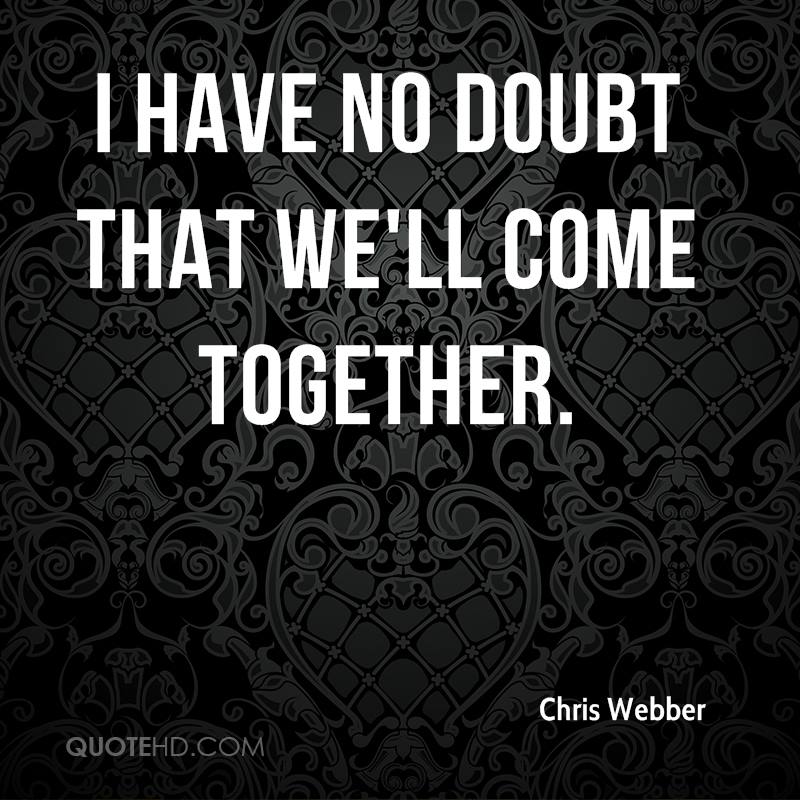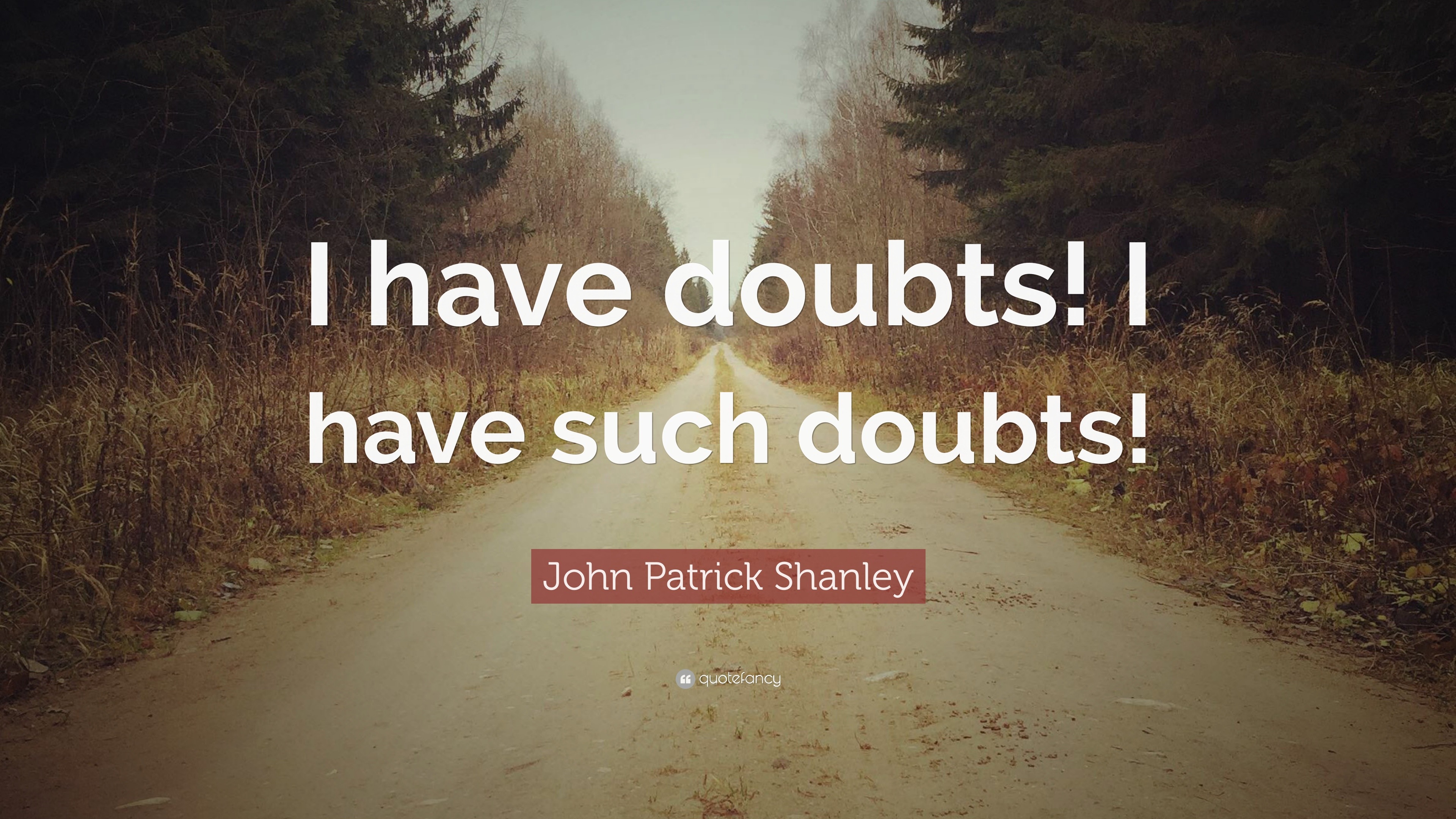I Have Doubts: A Comprehensive Guide To Navigating Uncertainty
Life's full of twists and turns, and let's be real—sometimes we all find ourselves in the "I have doubts" zone. It’s like standing at a crossroads where every path looks kinda shady, and you’re not sure which way to go. Whether it's about your career, relationships, or even life decisions, doubt can creep in like an uninvited guest at a party. But here's the thing: doubt isn’t always the bad guy. In fact, it can be a powerful tool for growth if you know how to handle it.
Think about it this way: doubt is like a little voice in your head that says, "Hey, wait a minute. Are you sure about this?" That voice can save you from making some seriously bad decisions. But when it starts shouting louder than your confidence, that’s when things get tricky. So, let’s dive deep into what doubt really means, why it happens, and—most importantly—how to manage it so it doesn’t take over your life.
In this article, we’ll cover everything from understanding the psychology behind doubt to practical tips for overcoming it. Whether you're second-guessing your career move, relationship status, or just life in general, you're in the right place. Let’s make sure you leave here feeling more confident and ready to tackle whatever comes your way.
Read also:Female Paladin Names Your Ultimate Guide To Strong Inspirational Names
Here's a quick overview of what we'll be discussing:
- What Does "I Have Doubts" Really Mean?
- Common Causes of Doubt
- The Psychology Behind Doubt
- Doubt in Relationships
- Doubt in Career Decisions
- Strategies to Overcome Doubt
- When to Seek Professional Help
- The Role of Self-Reflection
- Real-Life Examples of Overcoming Doubt
- Conclusion: Embracing Uncertainty
What Does "I Have Doubts" Really Mean?
When you say "I have doubts," what you're really saying is, "I'm uncertain." Doubt is essentially the mental state of hesitation or uncertainty about something. It can pop up in any area of life—whether it's deciding whether to take that new job, questioning if you're with the right partner, or even wondering if you made the right choice ordering that pizza last night.
But here's the kicker: doubt isn't always a bad thing. In fact, it's often a sign that you're paying attention to important details. Think about it—without doubt, we’d probably make a ton of impulsive decisions that could lead to regret. So, while doubt might feel uncomfortable, it’s actually a pretty useful tool when used correctly.
Why Do We Doubt?
Let’s break it down. Doubt usually stems from a few key areas:
- Fear of Failure: You’re scared that if you make the wrong choice, things might go south.
- Uncertainty: Sometimes, there’s just not enough information to make a clear decision.
- Self-Doubt: This is when you question your own abilities or worth.
Understanding where your doubt comes from is the first step toward managing it. And trust me, managing doubt is a skill that can change your life.
Common Causes of Doubt
Doubt doesn’t just pop up out of nowhere—it’s usually triggered by certain situations or experiences. Some of the most common causes include:
Read also:Lil Durk Quotes A Deep Dive Into The Words Of A Street Poet
1. Lack of Information: When you don’t have all the facts, it’s easy to feel uncertain. Imagine trying to pick a restaurant without knowing the menu. It’s kinda like flying blind.
2. Past Experiences: If you’ve been burned before—whether in a relationship or a job—you might carry that baggage into new situations. It’s like wearing a heavy coat even when it’s summer outside.
3. Social Pressure: Sometimes, other people’s opinions can cloud your judgment. You might start doubting yourself because someone else thinks you’re making the wrong choice. But here’s the thing: their opinions don’t define your reality.
How Doubt Can Impact Your Life
Doubt can affect you in a lot of ways. It can make you second-guess yourself constantly, which can lead to missed opportunities. It can also create stress and anxiety, making it harder to focus on the things that really matter. But here’s the good news: with the right tools, you can learn to manage doubt and turn it into a positive force.
The Psychology Behind Doubt
Let’s get into the nitty-gritty of what’s happening in your brain when you experience doubt. According to psychologists, doubt is closely linked to the part of your brain responsible for decision-making—the prefrontal cortex. When you’re faced with uncertainty, this part of your brain goes into overdrive, trying to weigh the pros and cons of every possible outcome.
But here’s the thing: too much doubt can actually shut down your decision-making abilities. It’s like your brain gets stuck in a loop, constantly replaying the same worries over and over again. This can lead to something called "analysis paralysis," where you become so overwhelmed by the options that you end up doing nothing at all.
Breaking the Cycle of Doubt
The key to breaking the cycle of doubt is to train your brain to focus on solutions instead of problems. This can be done through techniques like mindfulness, cognitive-behavioral therapy (CBT), and even good old-fashioned self-talk. By reframing your thoughts and focusing on what you can control, you can start to reduce the power that doubt has over you.
Doubt in Relationships
Relationships are one of the most common areas where doubt can creep in. Whether it’s questioning your partner’s intentions or wondering if you’re with the right person, relationship doubt can be a real pain. But here’s the thing: doubt in relationships isn’t always a bad thing. In fact, it can be a sign that you’re paying attention to important issues.
Signs of Healthy Doubt:
- You’re questioning whether your needs are being met.
- You’re wondering if your communication could be better.
- You’re considering whether you’re growing together as a couple.
Signs of Unhealthy Doubt:
- You’re constantly questioning your partner’s loyalty.
- You’re obsessing over small issues that don’t really matter.
- You’re feeling more negative than positive about the relationship.
How to Address Relationship Doubt
When you’re dealing with relationship doubt, the best thing you can do is have an open and honest conversation with your partner. This doesn’t mean you should dump all your fears on them at once—it’s about finding a balance between expressing your concerns and listening to their perspective. And if things get really tough, don’t hesitate to seek out a therapist or counselor for help.
Doubt in Career Decisions
Career doubt is another biggie. Whether you’re wondering if you’re in the right job or considering a major career change, doubt can make the decision-making process feel overwhelming. But here’s the thing: doubt can also be a sign that it’s time for a change. If you’re constantly questioning whether your current job aligns with your values or goals, it might be worth exploring other options.
Questions to Ask Yourself:
- Am I fulfilled in my current role?
- Do I feel like I’m growing professionally?
- Is my work aligned with my long-term goals?
Overcoming Career Doubt
Overcoming career doubt often involves a combination of self-reflection and action. Start by identifying what you truly want from your career. Then, create a plan to move toward those goals. Whether it’s taking a course, networking with industry professionals, or even switching careers entirely, taking action can help reduce the power that doubt has over you.
Strategies to Overcome Doubt
So, how do you actually overcome doubt? Here are a few strategies that can help:
1. Practice Mindfulness: Mindfulness can help you stay grounded in the present moment, reducing the tendency to overthink future outcomes.
2. Challenge Negative Thoughts: When you catch yourself spiraling into doubt, ask yourself if those thoughts are really true. Often, they’re just exaggerated fears.
3. Focus on What You Can Control: Instead of worrying about things you can’t change, focus on the actions you can take to improve your situation.
4. Seek Support: Talking to friends, family, or a therapist can provide valuable perspective and help you see things more clearly.
Building Confidence
Building confidence is one of the best ways to combat doubt. This involves celebrating your successes, no matter how small, and reminding yourself of your strengths and accomplishments. It’s also about stepping outside your comfort zone and taking calculated risks to prove to yourself that you’re capable of handling uncertainty.
When to Seek Professional Help
Sometimes, doubt can become so overwhelming that it affects your daily life. If you find yourself constantly paralyzed by uncertainty or if it’s causing significant distress, it might be time to seek professional help. A therapist or counselor can provide valuable tools and techniques to help you manage doubt and improve your mental well-being.
What to Expect from Therapy
Therapy for doubt often involves exploring the root causes of your uncertainty and developing strategies to manage it. Techniques like CBT can help you reframe negative thoughts and build confidence in your decision-making abilities. And don’t worry—it’s not just for "serious" issues. Therapy can be a powerful tool for anyone looking to improve their mental health.
The Role of Self-Reflection
Self-reflection is a powerful tool for managing doubt. By taking the time to understand your thoughts and feelings, you can gain clarity and perspective on your situation. This might involve journaling, meditating, or simply setting aside time each day to reflect on your experiences.
Benefits of Self-Reflection:
- Improved self-awareness
- Increased clarity and focus
- Reduced stress and anxiety
Creating a Self-Reflection Routine
Creating a self-reflection routine doesn’t have to be complicated. Start by setting aside 10-15 minutes each day to reflect on your thoughts and feelings. You might want to write them down, talk them out with a friend, or simply sit quietly and meditate. The key is to make it a regular practice so it becomes a natural part of your daily life.
Real-Life Examples of Overcoming Doubt
Let’s take a look at a few real-life examples of people who’ve successfully overcome doubt:
Example 1: Sarah’s Career Change
Sarah was working in a corporate job that paid well but left her feeling unfulfilled. She doubted whether she should leave her stable position to pursue her dream of becoming a writer. After months of self-reflection and research, she decided to take the leap. Now, she’s a successful freelance writer who loves her work.
Example 2: Mark’s Relationship Journey
Mark was unsure if he was with the right partner. Instead of letting his doubts consume him, he had an honest conversation with his partner about his concerns. They worked together to address the issues and strengthen their relationship. Today, they’re happier than ever.
What These Stories Teach Us
These stories show that doubt doesn’t have to be a roadblock—it can be a stepping stone to growth. By facing your doubts head-on and taking action, you can turn uncertainty into opportunity.
Conclusion: Embracing Uncertainty
So, there you have it—a comprehensive guide to navigating the world of doubt. Remember, doubt isn’t something to fear—it’s something to embrace. By understanding its causes, recognizing its impact, and developing strategies to manage it, you can turn doubt into a powerful tool for growth and self-improvement.
Here’s a quick recap of what we’ve
Article Recommendations


